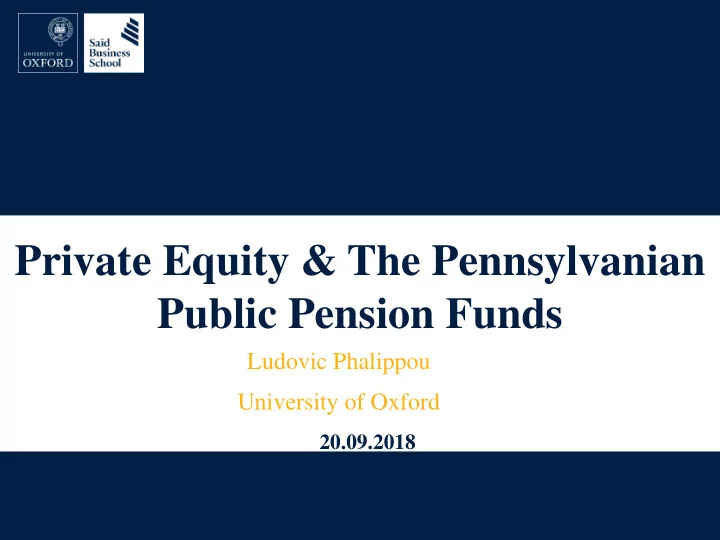

Private Equity & The Pennsylvanian Public Pension Funds Ludovic Phalippou University of Oxford 20.09.2018
PA pension funds & PE funds $40 billion PE PA Funds Pension Funds $12 billion fees $62 billion 11% p.a. Last ten years reported PE fees: $2.2 billion Estimated actual PE fees: $6 billion 2
Should PE funds deliver excess return? o Why don’t they increase their fees? o Why isn’t there money flowing in, up to the point where it’s gone? Usual response: it is an illiquid investment, hence PE funds have to share excess returns with those willing to provide them with capital If you are someone who does not mind this, go for it, you’ll get the reward and won’t mind the cost. But need enough people to care out there, for a compensation to exist 3
Could be worse (in theory) If, due to absence of rules/regulation, PE fund managers can window dress their track records, then Too much money might be allocated to PE If people find it fun, then Too much money might be allocated to PE 4
Or better (in theory) There might be diversification benefits, might do better than have with fund selection abilities etc. Conclusion: The case for investing in PE is (in theory) a lot less trivial than commonly accepted, but perfectly plausible 5
Empirical evidence Forget about war stories, no one earned 30% in PE, or even 20%, these figures popping up frequently in presentations and marketing material are all IRRs and not true rates of returns 6
Proper measurement Shows that PE returned about 10-12% p.a. over the last two decades Decade 1: 1998-2007 o US large stocks do poorly, S&P 500, Russell indices etc. have low returns, PE outperform them by 3% p.a. o The average stock returns as much as PE Decade 2: 2008-2017 o US large, mid-cap, small, value, growth stocks perform similarly, PE performs the same o Emerging market stocks do poorly though, PE outperforms global indices (e.g. MSCI world) 7
The S&P 500 index versus the average US stock, 1991-2007, Annualized spread in performance: 3% 16 14 CRSP equally weighted 12 10 8 6 S&P 500 4 2 0 LBO funds outperform S&P 500 by 3% p.a. 8
And then, these two indices from 2007 to 2017 3 2.5 2 1.5 1 0.5 0 200701 200801 200901 201001 201101 201201 201301 201401 201501 201601 201701 LBO funds performance equal to that of S&P 500 9
How about expected returns Gross of fees PE returned 18% p.a., twice as much as S&P 500 returns If returns are lower going forward and PE still earns twice what public equity earned, then o Fees are such that it will be more difficult for PE to outperform public equity returns o E.g. 10% gross of fees would generate a 5% net of fees 10
Conclusion Past returns are alright They do not seem to be anything to write home about though Fee are high and fee structure is such that outperformance is less likely in a low return environment Private markets are the future, public markets are probably doomed, hence need a new model transparency and honesty can only help the many great professionals working in PE, but will probably hurt not so good ones 11
Shall we care about fees that were paid? Typical answer: If you liked the soup, no need to know the recipe I object because: o Just mentioned that knowing fee structure gives insight in future returns because fees are certain, performance is not o Fairness/Ethical issue? 12
Analysis of the Penn Public PFs Together gave $40 billion to PE funds Received $50 billion back, and non-exited investments are worth $12 billion Same return as CalPERS and average PE fund, about 11% p.a. Estimated fees paid for this (net-of-fees) return: $12 billion Note: PE is an expensive investment strategy, this is not the profit made by fund managers (but about half of it is the performance- related fee they personally received) 13
Recommend
More recommend